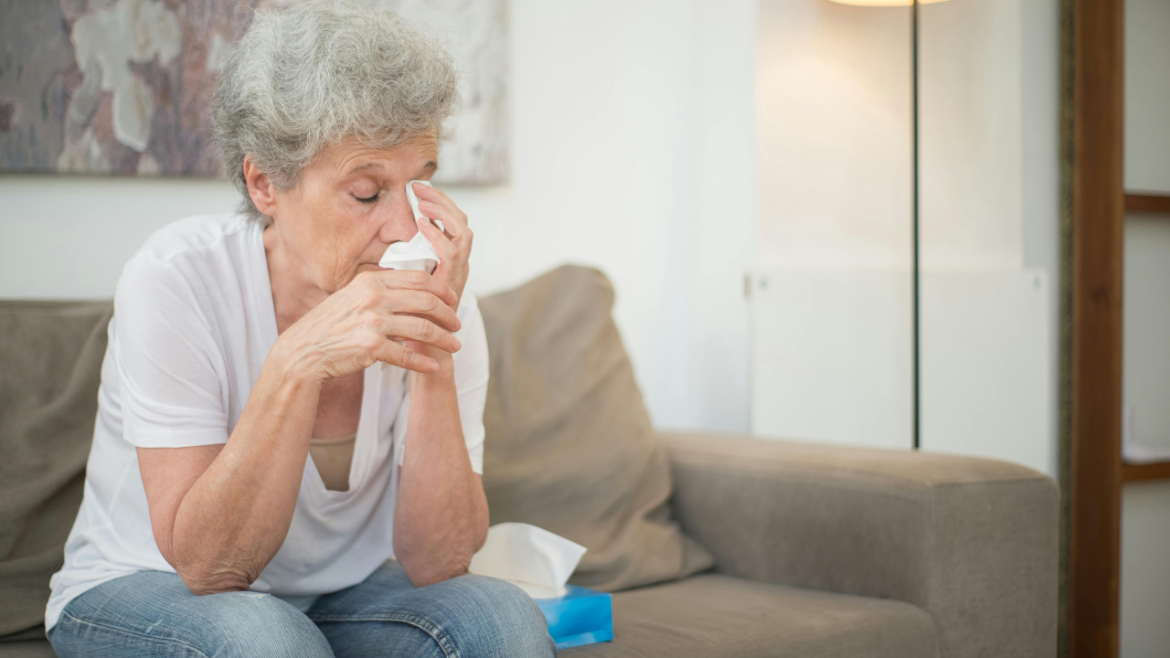Did you know that Leading Edge Senior Care has a Dementia Support Group? We meet monthly In Mesa. For more details <click here>
How To Protect Seniors During Allergy Season?
Allergy season can be particularly difficult for seniors, as their immune systems may not be as robust as they once were. With the increasing presence of allergens such as pollen, mold, and dust, seniors are more susceptible to allergic reactions, which can worsen other underlying health issues.
It is essential to understand how to protect seniors during this time, ensuring their comfort and safety throughout the season. This article offers practical tips and strategies to safeguard seniors from the effects of allergies.
Understanding the Risks for Seniors
As we age, our immune systems naturally become less efficient at fighting off allergens. For seniors, allergies may lead to more severe respiratory issues, including asthma exacerbations or even the onset of pneumonia. Many seniors already face chronic conditions such as cardiovascular disease, diabetes, or COPD, making their bodies less able to cope with the added stress of allergic reactions.
Furthermore, seniors often have weakened lung function, making them more vulnerable to airborne allergens that can cause or worsen respiratory symptoms. Allergic rhinitis, commonly known as hay fever, is a frequent concern during allergy season and can significantly impact the quality of life for older adults.
These health conditions combined with the physical limitations that come with aging make allergy season an especially challenging time for many seniors. That’s why it’s important to not only understand the potential risks but also to know how to manage and minimize exposure to allergens.
Creating an Allergy-Free Home Environment
One of the most effective ways to protect seniors from allergies is by controlling their environment. The home should be a sanctuary, free from allergens that may trigger symptoms. Here are some practical tips for keeping a senior’s living space safe:
- Maintain Cleanliness: Regular cleaning can go a long way in reducing allergens in the home. Dust, mold, and pet dander are common irritants that can accumulate in the home, so it’s essential to clean floors, upholstery, and surfaces frequently. Consider using a vacuum cleaner with a HEPA filter to trap airborne particles, preventing them from recirculating.
- Air Purifiers: High-efficiency particulate air (HEPA) filters can remove allergens from the air. Investing in a quality air purifier can significantly improve indoor air quality, especially in bedrooms and living areas where seniors spend a lot of time. Make sure the air purifier is appropriately sized for the room to achieve optimal results.
- Close Windows During Peak Pollen Times: During allergy season, pollen levels are highest in the early morning and late afternoon. Keep windows closed during these times to prevent pollen from entering the home. If the weather is nice, seniors can still enjoy fresh air by using air conditioning, which can help filter out allergens.
- Wash Bedding Regularly: Dust mites, one of the most common indoor allergens, tend to thrive in warm, humid environments like bedding. Be sure to wash sheets, pillowcases, and blankets frequently in hot water to kill dust mites and remove any other allergens.
Medications and Treatments for Allergy Relief
Managing allergies with the right medications is crucial for seniors during allergy season. However, it’s important to approach treatment cautiously. Many over-the-counter allergy medications can cause side effects, such as drowsiness or dizziness, which can be dangerous for seniors. It’s essential to consult a doctor before starting any new medications.
- Antihistamines: These medications can help alleviate symptoms such as sneezing, runny nose, and itchy eyes. Non-sedating antihistamines are often the preferred choice for seniors, as they are less likely to cause drowsiness.
- Nasal Sprays: For nasal congestion, saline nasal sprays or corticosteroid nasal sprays can provide relief. These treatments can reduce inflammation in the nasal passages, making it easier to breathe. Again, it’s essential to get a doctor’s recommendation before using any nasal sprays.
- Eye Drops: Allergic conjunctivitis, or itchy, watery eyes, is another common issue during allergy season. Over-the-counter antihistamine eye drops can help relieve these symptoms. Be sure to choose drops that are safe for long-term use and consult with a healthcare provider before starting them.
- Immunotherapy: In some cases, a doctor may recommend allergy shots or sublingual immunotherapy (under-the-tongue tablets). These treatments help desensitize the body to specific allergens over time, offering long-term relief.
Keeping Seniors Hydrated and Nourished
It’s crucial to ensure seniors stay hydrated and maintain a balanced diet, particularly during allergy season. Allergic reactions can cause dehydration due to increased mucus production, so seniors should drink plenty of fluids. Water, herbal teas, and clear broths are excellent options to help keep them hydrated. Additionally, consuming a nutrient-rich diet can support the immune system, making it better equipped to handle allergens.
Including foods high in antioxidants, such as fruits and vegetables, can help reduce inflammation and support overall health. Omega-3 fatty acids, found in fish such as salmon, can also help combat inflammation, which may ease allergy symptoms.
Ensuring Regular Medical Checkups
Routine medical checkups are important during allergy season, especially for seniors who have chronic health conditions. Regular visits to a healthcare provider will allow for the early identification of any potential complications and provide an opportunity to adjust allergy treatments accordingly. Seniors should also have an action plan in place in case of severe allergic reactions.
A physician can help establish a plan for dealing with symptoms, including when to seek emergency care if necessary.
Conclusion
Protecting seniors during allergy season requires a multifaceted approach that includes reducing allergens in the home, managing symptoms with the right treatments, maintaining a healthy diet, and ensuring regular medical checkups. With these strategies in place, seniors can enjoy better health and a more comfortable allergy season.
By being proactive and understanding the unique challenges seniors face during this time, caregivers and family members can play a pivotal role in helping them stay safe and symptom-free.

